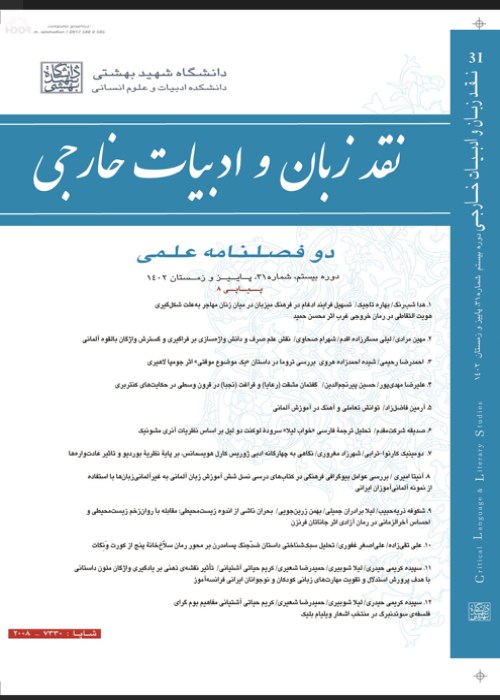The Discourse of Othering Nature: Ecocritical Reading of Wild Rare Animals in Amitav Ghosh's The Hungry Tide
Author(s):
Abstract:
Nowadays the discussions about nature and environments are significant particularly in humanities. The place of intersection between humanities and experimental sciences comes from the relationship between man and nature, and the fact that how these two issues are related and interacted. This critical approach plays a pretty important role in modern literature so that it can investigate the various dimensions of nature as the setting of literary works. In this regard, this paper, focusing on The Hungry Tide (2004) by Amitav Ghosh (1956- ) as an Indian Bengali writer, analyzes it based on ecocritical approach. Ecocriticism is an approach which relates humanities, experimental and environmental sciences to each other. Therefore, the writers, particularly the novelists, are concerned with nature, from forests to seas, and from domestic to wild animals. The Hungry Tide, as far as the title suggests, very significantly represents the sea, and the role of the waves as well as the marine animals. Besides the sea, the surrounding Islands are wonderful spaces, portrayed by Ghosh, which create a proper place for wild animals, particularly Bengali Tigers. The main character of the novel, Piya, is a young female cetologist, who studies a very rare kind of fish, with the help of a native fisherman, Fokir, who is innately an ecologist. While studying and following Dolphins, Piya is confronted with wild tigers. The nature-centred adventures of the novel are arranged based on what happens to the major characters. Besides portraying the natural events and accidents, The Hungry Tide surveys the history of creation of species of some plants and animals in a real or imaginary region and indicates the impact of man on environment and vice versa. In this paper, the ecocritical theories of Cheryll Glotfelty and Harold Fromm (1996) are used for analytical discussion of the novel; moreover, in conclusion the postcolonial ecocriticism of Graham Huggan and Helen Tiffin (2010) are used to lead the discussion to a new discourse of othering nature. Eventually, the paper comes to this conclusion that when one ring or member of ecosystem is omitted or destroyed, the whole system will be influenced and all the natural phenomena will experience critical changes or transformations.
Keywords:
Language:
Persian
Published:
Critical Language & Literary Studies, Volume:14 Issue: 18, 2017
Pages:
103 to 132
magiran.com/p1735883
دانلود و مطالعه متن این مقاله با یکی از روشهای زیر امکان پذیر است:
اشتراک شخصی
با عضویت و پرداخت آنلاین حق اشتراک یکساله به مبلغ 1,390,000ريال میتوانید 70 عنوان مطلب دانلود کنید!
اشتراک سازمانی
به کتابخانه دانشگاه یا محل کار خود پیشنهاد کنید تا اشتراک سازمانی این پایگاه را برای دسترسی نامحدود همه کاربران به متن مطالب تهیه نمایند!
توجه!
- حق عضویت دریافتی صرف حمایت از نشریات عضو و نگهداری، تکمیل و توسعه مگیران میشود.
- پرداخت حق اشتراک و دانلود مقالات اجازه بازنشر آن در سایر رسانههای چاپی و دیجیتال را به کاربر نمیدهد.
In order to view content subscription is required
Personal subscription
Subscribe magiran.com for 70 € euros via PayPal and download 70 articles during a year.
Organization subscription
Please contact us to subscribe your university or library for unlimited access!


